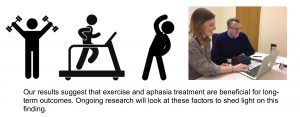Ongoing work in the C-STAR has been focusing on understanding predictors of long-term recovery in individuals with chronic aphasia.
Doctoral student, Lisa Johnson, is the lead author on a recently accepted article for publication in the American Journal of Speech Language Pathology. This article is forthcoming, and a link will be posted when available. For now, Lisa has written in as a guest blogger to summarize her findings. Read on, below!
__
Recently, the Aphasia Lab published an article titled, “Progression of Aphasia Severity in the Chronic Stages of Stroke” in the American Journal of Speech-Language Pathology. This was the first study from our lab that looked at the impact of health and demographic information across participants at multiple time-points.
Background
Previous studies have argued that aphasia recovery typically stops after about 6 months of the time of stroke. However, other recent studies have shown that language continues to improve years after stroke. We aimed to investigate what might lead someone to improve by comparing demographic variables and health variables, which I’ll describe in more detail in the Study Procedures section below.
Study Procedures
39 participants qualified for this study. All participants needed to:
- Have taken an aphasia severity assessment 2 or more times
- Have completed a case history form
The variables we were interested in were:
- Age at the time of the stroke
- How many days they exercise per week
- Whether they were male or female
- Age at the time of the aphasia assessment
- How many hours of treatment they received at the Aphasia Lab
- Whether or not they had diabetes
- How many years of education they received prior to stroke
Results
The results from this study show that it is just as likely for individuals to improve as it is for them to decline in the chronic stage. Importantly, the results indicate that individuals who continue to participate in treatment-based studies are more likely to improve than those who do not. Additionally, individuals with diabetes were also shown to perform much better if they exercise.

Conclusions
This study indicates two important points for our participants and persons living with aphasia: individuals with aphasia who seek treatment, even treatment-based lab studies, are more likely to improve than if they do not, and those who maintain an overall healthy lifestyle (i.e., regularly exercising) show an increase in language performance.